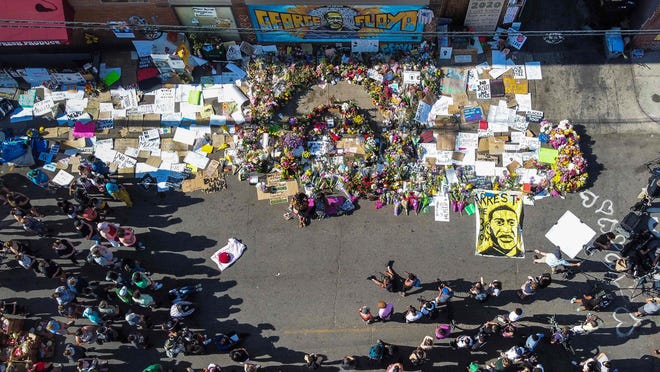Two former sheriff’s deputies will not face federal criminal civil rights charges for their involvement in the 2021 death of a 31-year-old Black man in a South Carolina jail, the Justice Department announced Wednesday.
Jamal Sutherland died in January 2021 after he was “forcibly extracted” from his cell at the Sheriff Al Cannon Detention Center, which is just outside of Charleston, the DOJ said in a news release.
Federal prosecutors decided there was not enough evidence to prove beyond a reasonable doubt that the deputies “willfully violated” federal law, according to the release. Proving an officer willfully deprived a person of their constitutional rights is the highest legal standard of intent, the department said.
“Neither accident, mistake, fear, negligence nor bad judgment is sufficient to establish a willful federal criminal civil rights violation,” the Justice Department said. “Accordingly, the review of this incident has been closed without a federal prosecution.”
Sutherland’s mother, Amy, said at a news conference Wednesday that she felt she had done everything possible to get justice for her son.
“I wanted to scream again,” she said when asked about her response to the decision. “But screaming days is over, there is no more screaming.”
South Carolina prosecutor:No charges for jail employees in death of mentally ill Black man
Sutherland, who had a long history of schizophrenia, was arrested on Jan. 4, 2021, for misdemeanor assault after damaging property and assaulting a staff member at a mental health and substance abuse center, according to a report from the Ninth Circuit Solicitor’s Office.
The next morning, Sutherland refused to leave his cell for a bond hearing and ignored repeated orders to kneel, videos released by the county showed.
Official policy allowed inmates to refuse to appear without force being used unless a judge ordered them to appear. But a directive from the detention center’s upper ranks instructed deputies to use an emergency restraint chair if an inmate refused to go to a bond hearing “the first time,” the solicitor’s office report found.
Videos showed deputies used pepper spray and repeatedly fired their stun guns while attempting to handcuff Sutherland. One deputy knelt on Sutherland’s back for more than two minutes and Sutherland could be heard on video saying “I can’t breathe.”
Lethal force?:Tasers are meant to save lives, yet hundreds die after their use by police
As deputies attempted to strap him into the emergency restraint chair, they realized he was unresponsive, according to a 52-page report from former Ada County Idaho Sheriff Gary Raney, a use of force expert hired by the solicitor’s office to review the incident. Officials performed CPR and Sutherland was later pronounced dead.
Sutherland’s death sparked protests and calls for criminal charges. Days after the county released video of the altercation in May 2021, the deputies involved – detention Sgt. Lindsay Fickett and detention Deputy Brian Houl – were fired. The Charleston County Council then unanimously approved a $10 million settlement for Sutherland’s family.
Sheriff:Two deputies fired after video shows death of South Carolina inmate
Charleston County Coroner Bobbi Jo O’Neal later told reporters that Sutherland likely died of a fatal dysrhythmia, or an abnormal heart rhythm, and changed the manner of death from “undetermined” to “homicide.” O’Neal said forensic pathologists found Sutherland’s “excited state,” a recent change in his prescription medications and the “subdual process” played a role in his death.
Raney’s report, released in July 2021, also concluded that the deputies’ actions contributed to Sutherland’s death. Raney added that the detention center’s “customs, practices, training, and lack of policy and capable supervision” were significantly responsible for the incident.
‘This should never happen’:Family of Jamal Sutherland, Black man who died in South Carolina jail, to get $10M settlement
Solicitor Scarlett Wilson called the actions seen on video damning, disturbing and upsetting, but decided not to charge the two former jail employees. Wilson said she could not prove the guards intended to kill Sutherland and said they were following training that had fostered a “militaristic culture” at the jail.
“This is how they were trained, and they didn’t have a reason to expect this outcome because they had done it so many times before,” she said.
Sutherland’s family and their attorneys, including prominent civil rights attorney Ben Crump, urged the solicitor to reconsider her decision. Crump did not respond to a request for comment from USA TODAY.
“We all know what the truth is – that they unjustly killed a young Black man who was having a mental health crisis,” Crump said outside Wilson’s office last October. “At some point, it just becomes reckless, reckless, reckless.”
Sutherland’s mother said Wednesday she hopes to help other families facing similar situations by making changes to the law. A bill named after Sutherland that would require people who are arrested at a mental health facility undergo an evaluation before their bond hearing has been introduced in the South Carolina Legislature.
“If the system fails you, you don’t go sit down. You get up and do something for somebody else,” she told reporters. “One day there’ll be a change so I’m just waiting for that day.”
Contributing: The Associated Press
Contact Breaking News Reporter N’dea Yancey-Bragg at nyanceybra@gannett.com or follow her on Twitter @NdeaYanceyBragg


